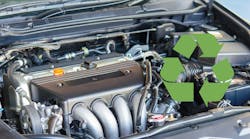At the NTEA Work Truck Show, Dish unveiled the first of 200 Roush CleanTech propane autogas-fueled Ford E-250 cargo vans that will enter the company's fleet in 2013. The satellite-TV company estimates these new propane autogas-powered vehicles will lower carbon dioxide emissions by 12.5 million pounds over the lifetime of the fleet's operation compared to gas-powered counterparts.
DISH's new alternative fuel vehicles will support residential and commercial customer service in Atlanta, Chicago, Detroit, Los Angeles and San Francisco.
"These clean-burning propane autogas vehicles are better for our environment, our communities and operate more efficiently," said Erik Carlson, executive vice president of service and installation at DISH. "DISH expects to save about $2,500 per vehicle in annual lifecycle costs due to a 55 percent reduction in fuel costs and the cleaner burning properties of propane autogas."
DISH researched multiple alternative fuels available in the marketplace. Four factors made propane autogas the best fit: cost savings, national availability of a domestically sourced fuel, on-site fueling benefits and OEM choices that meet service requirements. Propane autogas vehicles emit fewer greenhouse gases and smog-producing hydrocarbons than conventionally fueled vehicles.
Currently, propane autogas is the only alternative fuel being implemented in DISH's fleet.
"Economical, clean-burning propane autogas is an excellent option for fleets looking for more efficient operation," said Todd Mouw, vice president of sales and marketing for ROUSH CleanTech. "Propane autogas is sourced domestically and is cheaper per mile to operate."
Propane autogas offers the largest public refueling network of all alternative fuels. Additionally, private, on-site refueling infrastructure costs less than any other alternative fuel option. This makes it economical for DISH to install refueling stations at each of their initial deployment locations.
More than 90 percent of the propane used in the U.S. comes from domestic sources of natural gas and petroleum. Additionally, ROUSH CleanTech's supply chain is primarily based in North America. The domestic nature of both the fuel and the technology influenced DISH's decision.
"As one of the nation's largest fleets with locations across the country, we believe we can have a real impact by putting a viable alternative fuel to work for us," said Carlson.

